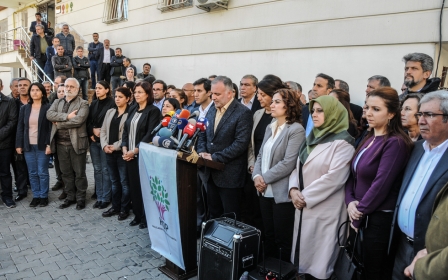Prospects for peace in Turkey growing bleak, HDP leader tells UK MPs

A leading member of Turkey's left-wing People's Democracy Party has warned UK MPs that moves to suppress his party are ruining prospects for peace between the state and Kurdish militants.
Ertugrul Kurkcu, an ethnic Turk and veteran leftist and the HDP's honourary president, told the House of Commons foreign affairs committee on Tuesday that “Turkish elites” had “ruined the checks and balances” in the country and left absolute power in the hands of President Recep Tayyip Erdogan.
Turkish courts have arrested over 35,000 people under a state of emergency imposed in the wake of the failed 15 July coup, which was aimed at overthrowing Erdogan's Justice and Development party (AKP) government.
Ten MPs from the HDP have been imprisoned so far this month, including co-leaders Selahattin Demirtas and Figen Yuksekdag. The vast majority of HDP MPs now risk arrest over alleged links to the PKK Kurdish militant group, after the parliament moved in May to strip parliamentarians of their immunity.
The situation has provoked outcry abroad, with some seeing it as a continuing erosion of Turkish democracy.
However, while European countries including Germany have voiced public concerns over the mass arrests and closure of dozens of newspapers and TV stations, the UK Foreign Secretary Boris Johnson recently visited Turkey and has pushed for stronger business ties with the country.
'We have not incited hatred'
Kurkcu warned that the democratic system in Turkey was under threat and called for international solidarity. "The judiciary is in disarray, the executive has taken all state institutions under its control."
“A parliamentarian in jail is an oxymoron," Kurkcu told the committee. "This is not something we should fight against on our own.”
He also criticised the other two major parties in the Turkish parliament - the secular-nationalist Republican People's Party (CHP) and the ultra-nationalist Nationalist Movement Party (MHP) - for joining with the AKP to strip MPs of their immunity.
The government has long claimed that the HDP is an extension of the Kurdistan Workers Party (PKK), which has been engaged in a guerilla conflict with the Turkish state since 1984, costing more than 40,000 lives.
The HDP maintains that it is independent from the PKK and is seeking a peaceful solution to the "Kurdish question".
Kurkcu said that the negotiating process with the PKK prior to the collapse of the ceasefire in July 2015 had been of great benefit for the Kurdish and Turkish people, "everything flourished politically and economically in Kurdish areas". But he added that "those who benefited from this did not thank [President] Erdogan for this, they cast their votes for the HDP. This made the negotiations process a very costly process for the government... so making peace was much more costly than making war."
Kurkcu said that the HDP's existence was a result of the "relatively democratically conditions" that existed in Turkey, "particularly between 2011 and 2015".
“Both the PKK and the HDP are deriving their energy and popular support from the Kurdish people," he explained.
“The Kurdish families who are voting for the HDP may also have daughters and sons fighting in the mountains” alongside the PKK, he said.
“We have included a peaceful, democratic and participatory line from the start...we have not incited hatred among people," he said, adding that “both Turkish and Kurdish people benefited from the peace and the ceasefire” that was established in 2013 and collapsed in July 2015.
Kurkcu has been involved in left-wing politics in Turkey since the 1960s, and was a member of the Turkish Revolutionary Youth Federation (DEV-GENC) which took up arms against the military government imposed in 1971 amid worsening political tensions.
He spent 14 years in prison between 1972 and 1986 after being captured by security forces. Among his activities in prison, he translated several books - including a biography of Karl Marx - into Turkish.
Uniting left and Kurds
Relations between leftists and the Kurdish liberation movement have often been tense over the decades, and Kurkcu was involved in some of the first successful attempts to bridge the political gap between the two during the 2000s. These efforts eventually led to the founding of the HDP.
Kurkcu warned the parliamentary committee that the Kurds would not accept less than power sharing on a national level because they “had made a lot of strides, a lot of gains” and that the situation in Turkey was becoming so fragile that even “Turks who have different aspirations from the Turkish rulers... are choosing to emigrate”.
Since the breakdown of the peace process in July 2015, more than 2,300 people have reportedly been killed, and swathes of Turkey's southeastern cities have been reduced to rubble.
The HDP president said that it was imperative that international governments put “human rights” before the “right to profit,” and take action against Turkey. Otherwise, he warned, violence will inevitably continue.
“Without having equal opportunities and a better democratic situation we cannot have peace," he said.
This article is available in French on Middle East Eye French edition.
Stay informed with MEE's newsletters
Sign up to get the latest alerts, insights and analysis, starting with Turkey Unpacked
Middle East Eye delivers independent and unrivalled coverage and analysis of the Middle East, North Africa and beyond. To learn more about republishing this content and the associated fees, please fill out this form. More about MEE can be found here.




